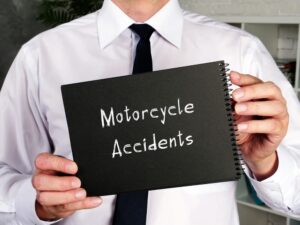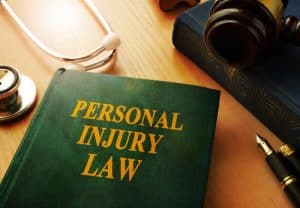Riding a motorcycle in Big Sky country makes the world feel bigger. The road stretches out ahead, and you’re completely alive in the moment. But all it took was a moment for one careless driver to turn that freedom into a crash that left you in agony and uncertainty about your future.
It’s natural to feel disoriented, frustrated, and anxious when you’ve suffered and lost so much. But wondering what to do after a motorcycle accident has upended your life shouldn’t overwhelm you even more. A motorcycle accident lawyer in Billings, MT, can help you understand your rights and fight for the compensation you deserve. You can take some straightforward steps that can make a big difference in your future and whether you obtain fair compensation for all your injuries and losses or end up paying the price for someone else’s mistakes.
SCHEDULE FOR A FREE CASE EVALUATION

Motorcyclists often talk about the sense of freedom on two wheels. In Montana, rides like the Beartooth Highway offer breathtaking mountain views and winding curves that attract riders from across the country.
Yet despite the joy of riding, motorcycles come with real risks, most often because other drivers fail to see or respect them on the road. Federal data consistently shows that most accidents involving a motorcycle and another vehicle are not the motorcycle riders’ fault.
According to the National Highway Traffic Safety Administration (NHTSA), 6,335 motorcyclists were killed in traffic crashes in one recent year, accounting for 15% of all traffic fatalities nationwide, even though motorcycles make up only 3% of registered vehicles. Tens of thousands more suffer serious injuries each year.
Some of the leading causes of motorcycle accidents include:
In Montana, the beauty of open highways attracts riders from all over the country. But even the most careful motorcyclists face real dangers from other drivers who fail to yield, drift into motorcycle lanes, or drive while distracted. A rider’s skill and caution can’t always protect them from drivers who don’t drive responsibly.
Motorcycle riders lack the protection of steel frames, seatbelts, and airbags. When a crash happens, even low-speed collisions can cause significant injuries.
Some of the most common injuries seen in motorcycle accidents include:
Some motorcycle accident injuries don’t cause symptoms immediately because adrenaline and shock can mask pain. Other injuries, like concussions or internal bleeding, may develop gradually over hours or even days. That’s why seeking medical care as soon as possible is important, even if you feel okay right after the crash.
After a motorcycle crash, your first priority should be taking care of your health. But medical treatment also plays a crucial legal role: it creates records that link your injuries directly to the accident.
Insurance companies look for any reason to pay less. If there’s a gap between the accident and your first medical appointment, they might argue that your injuries came from something else entirely. Delays in care can give insurers ammunition to minimize or even deny your claim.
Don’t skip follow-up visits, physical therapy, or other prescribed treatments. Gaps in care can weaken your case and leave you footing the bill for injuries caused by someone else.

Once your immediate medical needs are under control, it’s time to protect yourself legally and financially. These are the most important steps every rider should take after a crash.
Even if you’re still recovering at home or in the hospital, starting these steps early can help you build a strong claim and avoid costly mistakes.
After a motorcycle accident, you need the chance to focus on your recovery. But legal and financial challenges don’t wait. Insurance companies try to limit their liability by shifting undue blame onto riders, questioning how seriously you’re hurt, or offering settlements that fall far short of what you truly need. A motorcycle accident lawyer can help protect your rights and handle these challenges for you.
One of the biggest legal issues after a crash is fault. All states have some form of comparative fault rules, which determine how much compensation you can receive if you’re partially responsible for the accident. Under these rules, your financial recovery may be reduced by the percentage of fault assigned to you.
For example, in Montana, you can still recover damages as long as you’re not more than 50% responsible for the crash. However, the compensation you receive is reduced by your share of fault (Mont. Code Ann. § 27-1-702).
Your lawyer’s role is to fight for your best possible outcome, and often that means making sure insurance companies don’t blame you unfairly for an accident. They investigate the crash, gather evidence, negotiate with insurers, and ensure your claim includes all damages, both now and in the future.
Working with an experienced lawyer can make the difference between walking away with fair compensation or being left with bills you can’t afford.
Don’t let pain, inconvenience, or financial worries keep you from following through with treatment. Skipping physical therapy sessions, follow-up exams, or specialist appointments can hurt both your health and your claim.
Insurance companies watch for gaps in treatment. They might argue that you weren’t really hurt, or that you recovered quickly and no longer need compensation. Keeping every appointment builds a clear record of how the accident affected you physically.
Medical care after a motorcycle accident also plays a legal role because it creates records linking your injuries directly to the crash. Insurance companies look for any reason to pay less. If there are any gaps in your treatments, they might argue that your injuries aren’t serious or came from something else entirely.
Don’t let pain, worries about cost, or inconvenience keep you from attending every recommended medical appointment. Consistent treatment protects both your well-being and your right to fair compensation.
After a crash, your memory of pain, fear, and day-to-day struggles can fade over time. But these details matter when you’re pursuing compensation for pain and suffering or emotional distress.
Start a journal as soon as you can. Record things like:
Photos or short video clips showing your recovery can also be powerful evidence. Your own words and images can help your lawyer show how deeply the crash has affected your life. It can also serve as powerful evidence supporting your case before a jury if your claim goes to trial.
Evidence from a motorcycle crash can quickly disappear as roads are cleaned of crash debris, vehicles are repaired, and witnesses’ memories fade. If you have any photos of the accident, damaged riding gear, or contact information for witnesses, keep those items safe. They may become important proof of what happened and how serious your injuries are.
Don’t worry if you couldn’t take photos or gather evidence at the scene. A motorcycle accident lawyer can help investigate your crash, track down witnesses, obtain traffic camera footage before it’s erased, and preserve other critical evidence on your behalf. The sooner you involve a lawyer, the better your chance of securing details that might otherwise be lost over time.
After a motorcycle accident, insurance companies may reach out quickly and offer you a settlement. This money can be incredibly tempting for someone facing medical bills, lost income, and stress. But these quick settlement offers likely fall far short of covering the true cost of your injuries, future care, and other damages. Insurance companies offer low payouts early because they know injured people may not yet understand the full extent of their losses or how long recovery might take.
Beyond offering fast settlements, insurers may also try to limit your claim in other ways. They might ask for recorded statements, hoping you’ll say something that could be used to argue your injuries aren’t serious or that you share blame for the crash. Even casual conversations can become evidence against you.
A personal injury attorney can step in and handle all communication with insurance companies. They know the tactics insurers use and help you from the pitfalls you may encounter along the way to seeking compensation. Having a lawyer helps ensure you’re treated fairly and that any settlement reflects the accident’s full impact on your life.
It’s natural to want to update friends and family about how you’re doing. But after a motorcycle accident, social media can be dicey territory.
Insurance companies actively watch accident victims’ social media accounts. They might use a photo of you smiling at a family event, even if you were in pain the entire time, as supposed proof that your injuries aren’t serious.
Avoid posting anything about:
Also, ask friends not to tag you in photos or posts until your claim is resolved. It’s better to stay silent online than risk damaging your case.

State laws can shape the outcome of motorcycle accident claims. These laws determine important factors like how long you have to file a claim, whether you can recover damages if you’re partly at fault, and what evidence might affect your case.
Every state sets a deadline for filing a personal injury lawsuit, usually between two and three years. In Montana, for instance, the limit is three years from the date of the accident (Mont. Code Ann. § 27-2-204). Miss it, and you could lose your right to compensation entirely.
Comparative fault laws vary by state and determine whether an injured rider can still recover compensation if they were partly responsible for the accident and how much money might be reduced based on their share of fault.
For example, under Montana’s comparative negligence rules, you can recover damages as long as you’re not more than 50% at fault. However, your compensation would be reduced by the percentage of fault attributed to you.
For instance, if you’re found 30% responsible for the accident, your compensation would be reduced by 30%.
Helmet requirements vary widely. Some states require all riders to wear helmets. Others only require helmets for younger riders. In Montana, helmets are required for riders under 18, but optional for adults. Still, not wearing a helmet could reduce compensation for head injuries under comparative negligence rules, even if it’s legal.
Motorcycle crashes have financial and emotional consequences that go far beyond the initial hospital visit. Fortunately, the law allows riders injured by someone else’s negligence or recklessness to seek compensation for their losses. Depending on your specific situation, you could recover a range of damages. Here are some common damages:
These are the financial costs tied directly to the accident, such as:
Not all losses come with a bill attached. Non-economic damages cover the human toll of a crash, including:
Proving these losses often requires personal journals, mental health records, and testimony from family or friends about how your life has changed.
Losing someone you love changes your world in ways that are difficult to measure. On top of the deep grief and emotional trauma of losing a loved one, you and your family may be dealing with financial strain and a future that suddenly looks very uncertain.
No amount of money can fill that empty space, but the right compensation can help ease some of the burdens that come with your loss, including:
Yes. Insurance companies often try to blame riders or minimize payouts. A lawyer can protect your interests and fight for full compensation.
Yes, however, insurers may argue that not wearing one made your head injuries worse and try to reduce what they pay for those specific injuries. This doesn’t invalidate your claim. It means compensation for certain injuries might be lower. A lawyer can help protect your rights and fight for the full amount you deserve.
Most motorcycle accident claims settle out of court. However, if insurers refuse fair compensation, your lawyer may recommend filing a lawsuit.
Every case is different. Some claims resolve in a few months if injuries are minor and fault is clear. More serious injuries, complicated fault disputes, or large compensation claims can take longer, especially if a lawsuit becomes necessary.
When Montana’s open roads call, motorcycle riders here respond. But when a negligent driver’s actions turn your freedom and adventure into pain and trauma, Yellowstone Law can throw you a lifeline.
Our accident injury attorneys have helped riders and families in Billings and throughout Montana find a way forward after serious motorcycle accidents. We understand the physical pain, the emotional weight, and the financial uncertainty that follow a crash. We also know how to build strong cases that hold negligent drivers accountable and secure the compensation you need to rebuild your future.
If you’ve been injured by someone else’s negligence, call us at (406) 259-9986 or contact us online for a free consultation. We will take the time to listen to your experience, review your case, and help you find the best path forward. Let us fight for your maximum compensation while you focus on getting better.